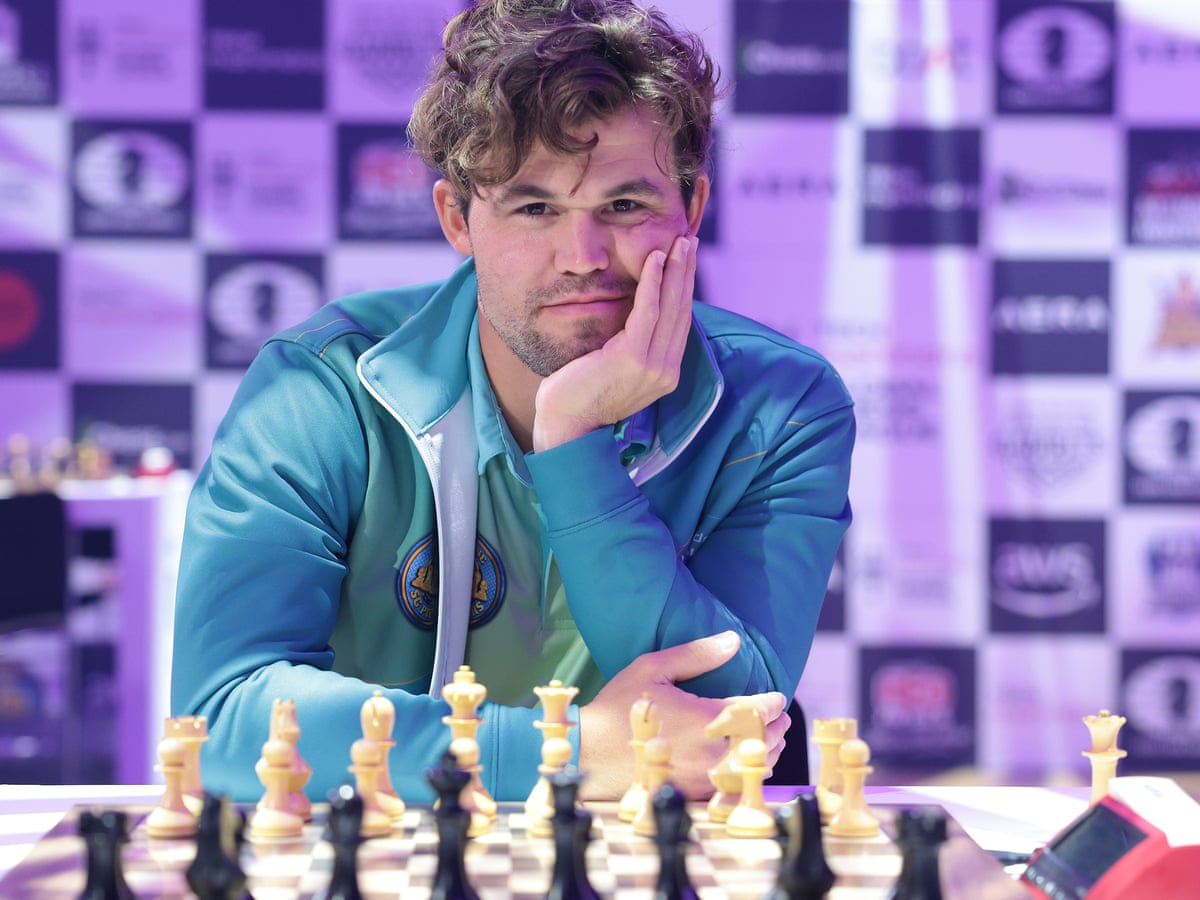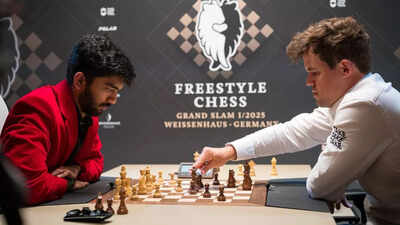The global chess community is witnessing a new chapter in one of its most compelling rivalries as Magnus Carlsen, the Norwegian chess legend, openly questions the rapid and blitz prowess of India’s reigning world champion, D Gukesh, during the ongoing Croatia tournament. Carlsen’s pointed remarks have sparked lively debate among fans and experts, especially in India, where Gukesh’s meteoric rise has inspired a new wave of chess enthusiasm.
For Gukesh, every encounter with Carlsen is a test of nerves and skill, but also an opportunity to learn from the very best. He has spoken about the respect he holds for Carlsen’s achievements and the motivation he draws from competing against such a formidable opponent. This attitude of humility combined with ambition is endearing him to fans and inspiring young players in India and beyond. As he continues to evolve, Gukesh’s rivalry with Carlsen is likely to become one of the defining stories of modern chess.
Ultimately, the ongoing duel between Carlsen and Gukesh is a celebration of the sport’s enduring appeal and its capacity for reinvention. Their contrasting styles, personalities, and approaches to the game make every match a must-watch event. As the Croatia tournament heads toward its climax, the chess world waits eagerly to see who will prevail—and what new chapters will be written in the saga of this electrifying rivalry.

1. Carlsen’s Provocation: “Gukesh Hasn’t Proven Himself in Faster Formats”
Magnus Carlsen, renowned for his dominance across all chess formats, did not hold back when asked about Gukesh’s chances in the rapid and blitz events in Croatia. Carlsen suggested that Gukesh’s reputation in classical chess does not automatically translate to success in faster formats. He emphasized that the field in Croatia is exceptionally strong and that players like Gukesh still have much to prove in rapid and blitz. Carlsen’s comments have added an extra edge to their encounters, with many interpreting his words as both a challenge and a strategic move to gain a psychological advantage.
Magnus Carlsen’s candid questioning of Gukesh’s rapid and blitz skills has sent ripples through the chess world, especially as the Croatia tournament unfolds with both players in the spotlight. Carlsen, known for his psychological acumen as much as his technical prowess, has often used subtle provocations to unsettle his rivals. This time, his remarks have been interpreted as both a challenge and a calculated move, designed to test the mental resilience of India’s young world champion. The chess community is divided—some see Carlsen’s comments as justified given Gukesh’s limited track record in faster formats, while others view it as a sign of Carlsen’s growing respect for the rising Indian star.
Gukesh’s journey to the top of the chess world has been nothing short of meteoric. Still in his teens, he has already achieved what many only dream of—becoming the world champion in classical chess and consistently defeating top-ranked opponents. However, rapid and blitz chess require a different skill set, emphasizing intuition, speed, and adaptability. Gukesh’s supporters argue that his recent performances show a steep learning curve and that he is quickly closing the gap with the world’s elite in these formats. His ability to bounce back after early setbacks in the Croatia tournament has only strengthened this narrative.
2. Gukesh’s Response: A Strong Start in Croatia
Despite the skepticism, Gukesh has responded with resilience. After an initial setback in the opening round, he quickly found his rhythm, securing key victories and finishing the day among the tournament leaders. Gukesh’s adaptability and composure have impressed many observers, who see his performance as a sign of his growing confidence in rapid and blitz formats. The Indian chess community has rallied behind him, viewing his strong start as a direct answer to Carlsen’s doubts and as a testament to his evolving skill set.
3. The Numbers: Carlsen’s Critique and Gukesh’s Progress
Carlsen’s critique is not without basis, as Gukesh’s rapid and blitz ratings have historically trailed his classical achievements. However, chess is a dynamic sport where momentum and self-belief can quickly shift the balance. Gukesh’s recent successes and his ability to challenge established champions have given him a new level of confidence, suggesting that he is closing the gap in all formats. The ongoing Croatia tournament is seen as a critical test of his progress and a chance to further silence his critics.
The Croatia tournament itself has become a battleground for this new rivalry. Each round is followed closely by fans and analysts, who dissect every move, time management decision, and psychological nuance. Carlsen’s dominance in rapid and blitz is well established, but Gukesh’s determination and willingness to take risks have made their encounters unpredictable and thrilling. The atmosphere in the tournament hall is electric whenever the two face off, with spectators sensing that they are witnessing the dawn of a new era in chess.
For Carlsen, the challenge posed by Gukesh is both a threat and a source of motivation. Having ruled the chess world for over a decade, Carlsen thrives on competition and has often spoken about the need for new challengers to keep the sport vibrant. His remarks about Gukesh may be intended to spur the youngster to greater heights, even as they serve as a reminder that the road to true greatness in chess runs through mastery of all formats. Carlsen’s own career is a testament to this philosophy, as he has dominated classical, rapid, and blitz chess with equal authority.
4. Rivalry Rekindled: The Aftermath of Their Previous Encounters
The rivalry between Carlsen and Gukesh has intensified following their dramatic clash in a previous tournament, where Gukesh managed to defeat Carlsen in a classical game. That victory marked a turning point, signaling the arrival of a new challenger to Carlsen’s longstanding dominance. The current tournament in Croatia is being closely watched as the next chapter in their evolving rivalry, with both players eager to assert their superiority in rapid and blitz chess.
Gukesh, for his part, has responded to the scrutiny with characteristic calm and focus. He has acknowledged the areas where he needs to improve but remains confident in his ability to adapt and learn. His preparation for the Croatia tournament included intensive practice in rapid and blitz games, working with coaches and analyzing the styles of top opponents. The results are already visible, as he holds his own against some of the fastest players in the world and continues to accumulate valuable experience.
The rivalry between Carlsen and Gukesh is also fueling a broader conversation about the evolution of chess. With younger players like Gukesh, Praggnanandhaa, and others making waves on the international stage, the sport is undergoing a generational shift. The new wave brings fresh energy, innovative strategies, and a willingness to challenge established hierarchies. Carlsen’s willingness to engage with these rising stars, both on and off the board, is helping to create a dynamic and compelling narrative for chess fans worldwide.
In India, Gukesh’s success has sparked a chess boom, inspiring thousands of youngsters to take up the game. Chess academies are reporting record enrollments, and online platforms are buzzing with activity as fans follow Gukesh’s games move by move. The media coverage of the Croatia tournament has brought chess into the mainstream, with debates about strategy, psychology, and sportsmanship reaching a wider audience than ever before. Gukesh’s rivalry with Carlsen is seen as a symbol of India’s growing stature in the world of chess.
5. Indian Chess Community Reacts: Pride and Rising Expectations
Carlsen’s remarks have ignited passionate responses within India’s chess circles. Many fans see his comments as a recognition of Gukesh’s growing threat to the established order. Social media is abuzz with discussions about Gukesh’s potential and the broader rise of Indian chess talent. The presence of other young Indian stars in the tournament adds to the excitement, as the country’s new generation continues to make its mark on the international stage.
The psychological dimension of their rivalry cannot be overstated. Carlsen’s mind games are legendary, and his ability to put pressure on opponents before the first move is made is part of his competitive arsenal. Gukesh, however, has shown remarkable composure, refusing to be drawn into off-board battles. His focus remains on the chessboard, where he lets his moves do the talking. This mental fortitude has earned him respect from peers and fans alike, even as he continues to refine his rapid and blitz skills.
As the Croatia tournament progresses, all eyes are on the next Carlsen-Gukesh encounter. Each game between them is more than just a contest of moves; it is a clash of generations, styles, and philosophies. The outcome of their battles will not only influence the tournament standings but also shape the narrative of modern chess. Whether Gukesh can consistently challenge Carlsen in rapid and blitz remains to be seen, but the rivalry is already enriching the sport and captivating audiences around the globe.
Looking ahead, the future of chess appears brighter than ever. With rivalries like Carlsen vs. Gukesh capturing the imagination of fans, the sport is poised for greater popularity and innovation. As both players continue to push each other to new heights, chess enthusiasts can look forward to many more memorable battles—each one a testament to the enduring appeal and infinite possibilities of the royal game.
The Croatian tournament is also serving as a crucial learning ground for Gukesh and his peers. Each round against seasoned grandmasters offers invaluable lessons in time management, psychological resilience, and tactical sharpness—qualities that are essential in rapid and blitz formats. Gukesh’s willingness to experiment with new openings and take calculated risks has impressed many observers, suggesting that he is not content to rest on his classical laurels. Instead, he is actively embracing the challenge of becoming a complete player, capable of excelling in all formats of the game.

This high-profile rivalry has also elevated the profile of chess tournaments in general, drawing new sponsors, media attention, and larger audiences both online and offline. With Carlsen and Gukesh at the center of the action, the Croatia event has become a showcase for the sport’s global appeal. Fans from around the world are tuning in to watch live broadcasts, analyze games, and engage in spirited discussions about strategy and sportsmanship. The excitement generated by their encounters is helping to attract a new generation of chess enthusiasts.
Follow: Magnus Carlsen
Also Read: 7 Bold Ways Deepinder Goyal’s LAT Aerospace Is Revolutionizing Regional Air Travel in India

